- Home
- Jennifer Donnelly
A Northern Light Page 6
A Northern Light Read online
Page 6
As soon as she said it, as soon as she talked about my dream like that and brought it out in the light and made it real, I saw only the impossibility of it all. I had a pa who would never let me go. I had no money and no prospect of getting any. And I had made a promise—one that would keep me here even if I had all the money in the world.
When he has to, Pa sells some of his calves for veal. The cows cry so when he takes them that I can't be in the barn. I have to run up to the cornfield, my hands over my ears. If you've ever heard a cow cry for her calf, you know how it feels to have something beautiful and new put into your hands, to wonder and smile at it, and then have it snatched away. That's how I felt then, and my feelings must have been on my face, because Miss Wilcox's smile suddenly faded.
"You're working this summer, aren't you?" she said. "At the Glenmore?"
I shook my head. "My pa said no."
"Well, not to worry. My sister Annabelle will give you room and board in exchange for a bit of housekeeping. She has a town house in Murray Hill and she's all alone in it, so there would be plenty of room for you. Between the scholarship and Annabelle, that's tuition, housing, and meals taken care of. For book money and the trolley and clothing and such, you could always get a job. Something part-time. Typing, perhaps. Or ringing up sales in a department store. Plenty of girls manage it."
Girls who know what they're doing, I thought. Brisk, confident girls in white blouses and twill skirts who could make heads or tails of a typewriter or a cash register. Not girls in old wash dresses and cracked shoes.
"I suppose I could," I said weakly.
"What about your father? Can he help you at all?"
"No, ma'am."
"Mattie ... you've told him, haven't you?"
"No, ma'am, I haven't."
Miss Wilcox nodded, curt and determined. She stubbed out her cigarette on the underside of her desk and put the ashy end in her purse. Miss Wilcox knew how to not get caught doing things she shouldn't. It was an odd quality in a teacher.
"I'll talk to him, Mattie. I'll tell him if you want me to," she said.
I laughed at that—a flat, joyless laugh—then said, "No, ma'am, I don't. Not unless you know how to duck a peavey."
un • man
"Afternoon, Mattie!" Mr. Eckler called from the bow of his boat. "Got a new one. Brand-new. Just come in. By a Mrs. Wharton. House of Mirth, its called. I tucked it in behind the coffee beans, under W You'll see it."
"Thank you, Mr. Eckler!" I said, excited at the prospect of a new book. "Did you read it?"
"Yup. Read it whole."
"What's it about?"
"Can't hardly say. Some flighty city girl who can't decide if she wants to fish or cut bait. Don't know why it's called House of Mirth. It ain't funny in the least."
The Fulton Chain Floating Library is only a tiny room, an overeager closet, really, belowdecks in Charlie Eckler's pickle boat. It is nothing like the proper library they have in Old Forge, but it has its own element of surprise. Mr. Eckler uses the room to store his wares, and when he finally gets around to moving a chest of tea or a sack of cornmeal, you never knew what you might find. And once in a while, the main library in Herkimer sends up a new book or two. It's nice to get your hands on a new book before everyone else does. While the pages are still clean and white and the spine hasn't been snapped. While it still smells like words and not Mrs. Higby's violet water or Weaver's mamma's fried chicken or my aunt Josie's liniment.
The boat is a floating grocery store and serves all the camps and hotels along the Fulton Chain. It is the only store—floating or not—for miles. Mr. Eckler starts out at dawn from Old Forge and makes his way up the chain—through First, Second, and Third Lakes, then all the way around Fourth Lake—stopping at the Eagle Bay Hotel on the north shore and Inlet on its east end—then heads back down to Old Forge again. You can never miss the pickle boat. Nothing on water—or land, for that matter—looks quite like it. There are milk cans on top of it, bins full of fruits and vegetables on the deck, and a huge pickle barrel in the back, from which it takes its name. Inside the cabin are sacks of flour, cornmeal, sugar, oats, and salt; a basket of eggs; jars of candy; bottles of honey and maple syrup; tins of cinnamon, nutmeg, pepper, and saleratus; a box of cigars; a box of venison jerky; and three lead-lined tea chests packed with ice—one for fresh meat, one for fish, and the third for and butter. Everything is neat and tidy and fits snugly into place so it won't get tossed about in rough weather. Mr. Eckler sells a few other items as well, like nails and hammers, needles and thread, postcards and pens hand salve, cough drops, and fly dope.
I stepped onto the boat and went belowdecks. The House of Mirth was under W, like Mr. Eckler said it would be, only it was wedged in next to Mrs. Wiggs of the Cabbage Patch. Mr. Eckler sometimes gets authors and titles confused. I signed it out in a ledger he kept on top of a molasses barrel, then rooted around behind a crate of eggs, a jar of marbles, and a box of dried dates but found nothing I hadn't already read. I remembered to get the bag of cornmeal we needed. I wished I could buy oatmeal or white flour instead, but cornmeal cost less and went further. I was to get a ten-pound bag. The fifty-pound bag cost more to buy but was cheaper per pound and I'd told Pa so, but he said only rich people can afford to be thrifty.
Just as I was about to climb back upstairs, something caught my eye—a box of composition books. Real pretty ones with hard covers on them, and swirly paint designs, and a ribbon to mark your place. I put the cornmeal down, and Mrs. Wharton, too, and picked one up. Its pages were smooth and white. I thought it would be a fine thing to write on paper that nice. The pages in my old composition book were rough and had blurry blue lines printed on them, and were made with so little care that there were slivers of wood visible in them.
When I got back on deck, I saw that Royal Loomis had come onboard. He was paying for two cinnamon sticks, ten pounds of flour, a tin of tooth powder, and a bag of nails. He frowned at the amount on the all and counted his change twice, chewing on a toothpick all the while.
"Hey, Royal," I said.
"Hey."
I handed Mr. Eckler fifty cents of my father's money for the cornmeal. "How much is this?" I asked, holding up one of the pretty composition books. I had sixty cents from all the fiddleheads Weaver and I had sold to the Eagle Bay Hotel, plus the spruce gum we'd picked and sold to O'Hara's in Inlet. It was money I knew I should have given to my pa. I'd meant to, I did. I just hadn't gotten around to it.
"Them notebooks? Them are expensive, Mattie. Eye-talians made 'em. Got to get forty-five cents apiece," he said. "I've got some others coming in for fifteen cents in a week or so if you can wait."
Forty-five cents was a good deal of money, but I didn't want the ones for fifteen cents, not after I'd seen the others. I had more ideas. Tons of them. For stories and poems. I chewed the inside of my cheek, deliberating. I knew I would have to write a lot when I went to Barnard—if I went to Barnard—and it might be a good idea to get a head start. Weaver had said I should be using my words, not just collecting them, and I knew they would just glide across this beautiful paper, and when I was done writing them, I could close them safely inside the covers. Just like a real book. Guilt gnawed at my insides. I took the money from my pocket and gave it to Mr. Eckler quickly, so the thing was done and I couldn't change my mind. Then I watched breathlessly as he wrapped my purchase in brown paper and tied it with string. I thanked him as he handed me the package, but he didn't hear me because Mr. Pulling, the station-master, was asking him the price of his oranges.
As I stepped onto the dock I heard Mr. Eckler shout, "Hold on, Mattie!"
I turned around. "Yes, sir?"
"Tell your pa I want to buy milk from him. I've only got room for so many cans up top, and I'm running out before I even get up to Fourth Lake. I'd give him my empties and take on four or five full ones. Could sell more on the way back if I had more to sell."
"I'll tell him, Mr. Eckler, but I know he's already promised the Glenmore a
nd Higby's and the Waldheim. Plus the Eagle Bay Hotel. More have asked him, but he doesn't think he'll have enough to go round."
Mr. Eckler spat a mouthful of tobacco juice into the lake. "How big's his herd now?"
"Twenty head."
"Only twenty? But he's got, what? Sixty-odd acres? He could pasture a lot more than twenty on that."
"He only has twenty-five acres cleared, and a lot of it's plowed for crops."
"What's he doing with the rest of it? Thirty-five acres of woodland ain't no use to a farmer. He's paying taxes on the land, ain't he? On land he ain't even using! He ought to clear it for pasture, not let it set idle. He ought to build up his herd."
"He means to clear it. Meant to. But then ... well, with Lawton gone and all, it's just ... hard," I said quietly, conscious that Royal was listening to my every word.
Mr. Eckler nodded. He looked embarrassed. He knew Lawton had left. Everyone did. He'd asked me why, but I couldn't tell him. Or Weaver or Minnie or anyone else who asked. Mamma was gone because she died; I could explain that to people. My brother was gone, too. The brother who once spent all the money he'd made selling bait to sports to buy me a composition book and a pencil when he'd found me crying in the barn because Pa wouldn't buy them. Lawton was gone and I didn't even know why.
"Well, you tell him come see me, Matt. Royal, you tell your pa, too. I just seen men clearing for two new camps on Third Lake. Got Lon Wood building onto his place up here, plus Meeker's and the Fairview doing improvements, too. Got more and more summer people coming every day and it ain't even summer yet. If either of you can get me milk to sell, I can sell it."
"Yes, sir. I'll tell him," I said, then set off for home at a good clip. School had let out an hour before. My sisters would be well up our road. There was milking to do, and manure to shovel, and pigs and chickens to feed, and ourselves to feed, too.
I heard a thump on the dock behind me. "You like a ride, Matt?" said a voice at my elbow. It was Royal.
"Who? Me?"
"Ain't nobody else here named Matt."
"All right," I said, grateful for the offer. The cornmeal was heavy and I'd get home a lot faster if I rode.
I put the cornmeal in the back of the buckboard, climbed up on the hard wooden seat, and settled myself next to Royal. Buckboards are all anyone drives in the North Woods. Anyone with any sense. Some of the new folks with their just-built camps bring their buggies, but they soon give them up. Buckboards are plain—just a few planks with a pair of axles nailed on under them, a seat or two, and maybe a wagon box on the top. But plain is what works best. The planks have bounce in them, and the bounce keeps the wheels from knocking the teeth out of your head on the bad roads.
"Giddyap!" Royal told the horses. He coaxed them to turn the creaky rig around in the hotel's drive while avoiding a fringe-topped surrey carrying a touring party that had just arrived on the steamer Clearwater and was bound for Big Moose Lake. The horses, a pair of bays, were new. Pa said Mr. Loomis had bought them cheap from a man outside of Old Forge who'd lost his farm to the bank. They whickered and blew, shy of the surrey, but Royal kept them calm.
He raised his hand in greeting to Mr. Satterlee, the tax assessor, who passed us on his way to the hotel. Mr. Satterlee waved back but did not smile. "Bet he's just come from the Hubbards'," Royal said. "He's slapping a lien on their land. That good-for-nothing Emmie didn't pay her taxes again."
I wondered at his harshness. And not for the first time. "Royal, what do you have against the Hubbards?" I asked. "They're just poor folks. They don't hurt anyone."
I got a snort for an answer. Royal didn't speak at all as we went up the hotel's long drive, past its freshly manured vegetable garden and its furrowed potato field. We passed the railroad station and crossed the tracks and then the highway—a narrow dirt road that ran between Old Forge and Inlet. That was Eagle Bay, every bit of it—a bay on Fourth Lake, a hotel sitting on it, a railroad station, a set of railroad tracks, and a dirt road. It wasn't a town. It wasn't even a village. It was at most a destination. Unless you happened to live there. Then it was home.
As Royal steered the team toward the Uncas Road, he suddenly turned to me and said, "You still playing that game?"
"What game?"
"That game of yours. You know, fooling with words and such."
"It's not fooling," I said defensively. He made my word of the day sound childish and silly.
"You really look up a new word every day?"
"Yes."
"What was it today?"
"Unman."
"What's it mean?"
"To break down the manly spirit. To deprive of courage or fortitude."
"Huh. Had that right on the tip of your tongue, didn't you? You sure are a notional girl."
"Notional." Royal talks like all the boys do around here. He says "ramming" when he means visiting and "chimley" for chimney. Mamma used to swat us for saying "chimley." She said it made us sound like hicks. Royal also says "don't" when he means do. "So don't I," he'd say to Lawton when Lawton said he wanted to go fishing. I tried, more than once, to explain to him that he really was saying "So do not I," which meant he was disagreeing with Lawton and didn't want to go fishing, but it never made any impression. At least he didn't say "chiney" for china or "popples" for poplar trees. That was something.
He nodded at the book in my lap. "What you got there?"
"A novel. The House of Mirth."
He shook his head. "Words and stories," he said, turning onto the Uncas Road. "I don't know what you see in them. Waste of time, if you ask me."
"I didn't ask you."
Royal didn't hear me or he didn't care if he did. He just kept right on talking. "A man's got to know how to read and write, of course, to get along in the world and all, but beyond that, words are just words. They're not very exciting. Not like fishing or hunting."
"How would you know, Royal? You don't read. Nothing's more exciting than a book."
The toothpick moved from the left side of his mouth to the right. "That so?" he said.
"Yes, that's so," I said. Finishing it. Or so I thought.
"Huh," he said. And then he snapped the reins. Hard. And barked, "Giddyap!" Loudly. I heard the horses snort as he gave them their head. The buckboard shuddered, then picked up speed.
I looked at the team, new and lively and unpredictable, and then at the Uncas Road, which was nothing but rocks and holes and corduroy. "Are we in a hurry, Royal?" I asked.
He looked at me. His face was serious, but his eyes sparked mischief. "This is the first time I've had them out. Don't really know what they'll do. Sure like to see what they're made of, though ... Hee-YAW!"
The horses lurched forward in their harnesses; their hooves pounded against the hardpan. Mrs. Wharton's novel slid off my lap and thudded to the floor, along with my new composition book. "Royal, stop!" I shouted, clutching the dash. The buckboard was bouncing and banging over the rutted road so hard I was sure one of us would fly out of it. But Royal didn't stop. Instead, he stood up on the seat, cracked the reins, and spurred the team on. "Slow down! Right now!" I screamed. But he couldn't hear me. He was too busy whooping and laughing.
"Stop, Royal! Please!" I begged. And then we hit a deep hole and I was thrown across the seat. I banged my head on the seat back and only kept myself from falling out by grabbing his leg. I saw colors flash by on the side of the road. The blue of Lou's coveralls, the yellow of Beth's dress. They can tell Pa, I thought wildly. After Royal kills us both, at least they can tell Pa how it happened.
We took a bend so hard, I felt the wheels on the right side come off the ground, then crash back down. I managed to right myself, one hand still clutching Royal, the other scrabbling at the dashboard. The wind tore my hair free of its knot and made my eyes tear. I looked behind us and saw a cloud of dust rising up from the road. After what seemed like forever, Royal finally slowed the team to a trot and then to a walk. He sat down. The horses pulled at the reins, snorting and shaking thei
r heads, wanting more. He talked to them, shushing and clucking at them, calming them down.
"Hoo-wee!" he said to me. "Thought we was in the ditch for a second there." And then he touched me. He leaned across the seat and pressed his hand to my heart. Palm flat against my ribs. Thumb and fingers jammed up under my breast. In the split second before I slapped it away, I felt my heart beat hard against it.
"Tickers pounding fit to burst," he said, laughing. "Like to see a book do that."
I picked my things up off the buckboard's floor with shaking hands. There was a smudge on the cover of Mrs. Wharton's novel and the spine was dented. I wanted to answer Royal back with something clever and cutting. I wanted to defend my beloved books, to tell him there's a difference between excitement and terror, but I was too angry to speak. I tried to catch my breath, but every gulp of air brought the smell of him with it—warm skin, tilled earth, horses. I closed my eyes but only saw him standing on the buckboard seat, whooping. Tall and strong against the sky. Heedless. Fearless. Perfect and beautiful.
I thought of my word of the day. Can a girl be unmanned? I wondered. By a boy? Can she be unbrained?
Hamlet is drooling again. Silver strings of slime hang from his lips. He whines, then snorts, then lets out a long, gusty burp. He is my least favorite guest, after table six. I toss him a buttermilk pancake from the plate I'm holding, and he swallows it in one gulp. He eats half a roasted chicken at every meal, a broiled minute steak, and a dozen pancakes. He'd eat ten dozen if he could get them.
Hamlet belongs to Mr. Phillip Preston Palmer, Esquire—a lawyer from Metuchen, New Jersey. I met him two weeks ago, just after he arrived. He bounded into the dining room and backed me into a corner, trying to get at a platter of bacon I was carrying. Hamlet, that is. Not Mr. Palmer.

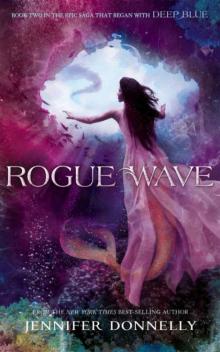 Rogue Wave
Rogue Wave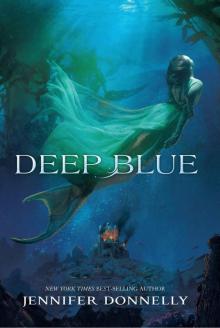 Waterfire Saga, Book One: Deep Blue (A Waterfire Saga Novel)
Waterfire Saga, Book One: Deep Blue (A Waterfire Saga Novel)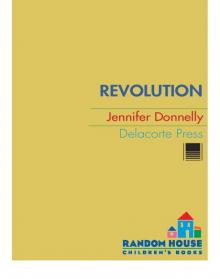 Revolution
Revolution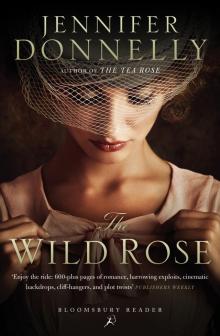 The Wild Rose
The Wild Rose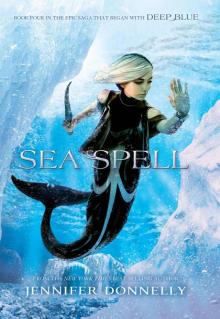 Waterfire Saga (4 Book Series)
Waterfire Saga (4 Book Series)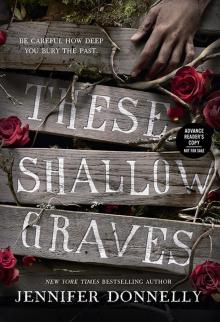 These Shallow Graves
These Shallow Graves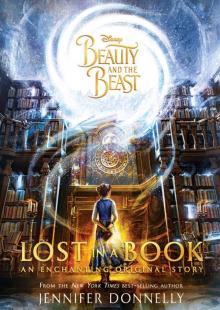 Beauty and the Beast: Lost in a Book
Beauty and the Beast: Lost in a Book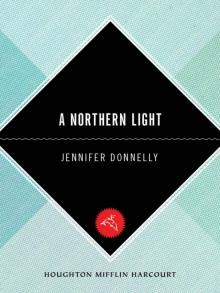 A Northern Light
A Northern Light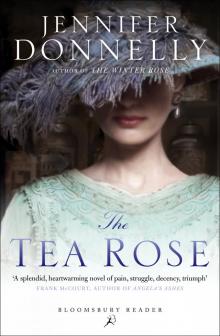 The Tea Rose
The Tea Rose Waterfire Saga, Book Three: Dark Tide: A Deep Blue Novel
Waterfire Saga, Book Three: Dark Tide: A Deep Blue Novel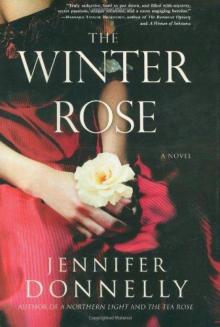 The Winter Rose
The Winter Rose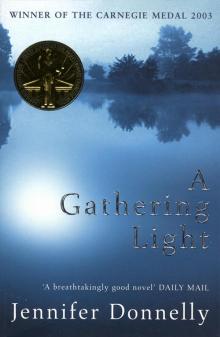 A Gathering Light
A Gathering Light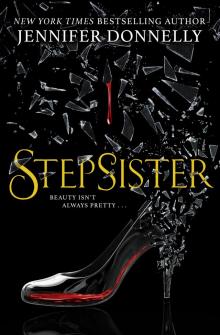 Stepsister
Stepsister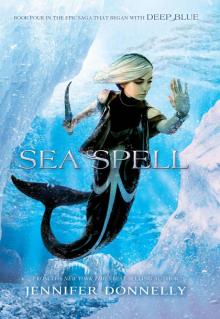 Waterfire Saga, Book Four: Sea Spell: Deep Blue Novel, A
Waterfire Saga, Book Four: Sea Spell: Deep Blue Novel, A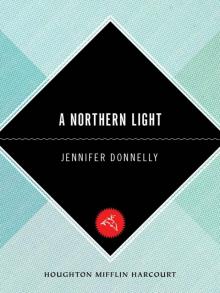 Northern Light
Northern Light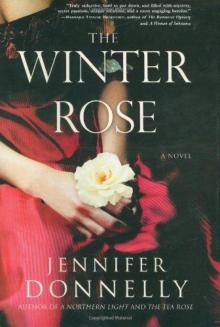 Winter Rose, The
Winter Rose, The